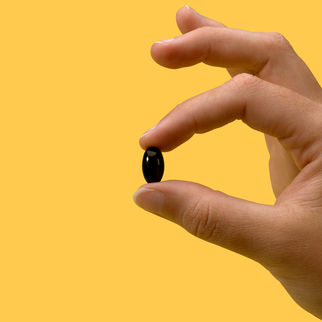In our non-stop world, we often prioritize everything but ourselves. Our wellness tends to fall by the wayside, and it's only when our bodies start to protest that we listen.
A successful workout isn't just about the grind — it's also about how we take care of ourselves post-workout. Recovering effectively from your workout can make a significant difference in your fitness journey.
Why Is Recovery From Your Workout Crucial?
As they say, "No pain, no gain." But what if you could gain without unnecessary pain?
Proper post-workout recovery is not a luxury — it's a necessity. It's the period when real growth happens, and the time when your body rebuilds and strengthens itself. The workout is the stimulus, but the recovery is where your body adapts and the muscle-building magic happens.
Faster muscle recovery also means you're ready for your next workout sooner. It allows you to train more frequently and with greater intensity, leading to quicker progress and improvement in your overall fitness level.
Overall, a good recovery routine helps to prevent injuries, improves performance, increases strength, and helps maintain a consistent and effective training program.
What Happens to Your Body During a Workout?
To understand recovery, we must first understand what happens when we exercise.
When you engage in intense exercise, such as weightlifting or high-intensity interval training, you cause micro-damage to your muscle tissues. This is not a bad thing — muscle damage is a normal process where old, weaker muscle fibers are broken down to make room for bigger, stronger ones.
During your workout, your heart rate increases, your blood vessels dilate, and blood flow to your working muscles increases. Achieving all of these functions will require extra fuel, so your body will be using up its stored supply of glycogen, resulting in depleted energy reserves.
Lastly, waste products such as lactic acid accumulate in your muscles, which may contribute to muscle fatigue. As your body's homeostasis is disrupted during a workout, a whole array of physiological processes kicks in to bring it back into balance.
What Causes Muscle Soreness After a Workout?
Have you ever felt muscle soreness and stiffness a day or two after a tough workout? This is known as delayed onset muscle soreness (DOMS), a common result of physical activity that stresses the muscle tissue beyond what it's accustomed to.
As mentioned earlier, putting our bodies through strenuous activity creates microscopic tears in the muscle fibers. These micro-injuries trigger an automatic response from your body, leading to an increase in blood flow to the area, swelling, and, consequently, discomfort.
While this tension isn’t ideal, it’s necessary because it signals the body to start the muscle repair process. The feeling of soreness is a natural part of the workout recovery process and a sign of adaptation. However, excessive or prolonged soreness could hinder your training routine, and that's where implementing effective recovery strategies becomes vital.
15 Tips for Recovering Faster From Workouts
Getting fit is a journey, and every journey needs some strategy and planning. Just as important as your workout is what you do afterward.
These 15 tips can optimize your post-workout recovery, minimize muscle soreness, and keep your body in peak condition:
1. Hydrate Thoroughly
It's no secret that hydration is vital, but it plays an especially important role in post-workout recovery. Exercise causes fluid loss through sweating, and replenishing these lost fluids can help accelerate your recovery after exercise.
Water supports every metabolic function and nutrient transfer in the body, so getting enough of it is critical for optimal muscle recovery. Staying hydrated helps your body flush out toxins, maintains optimal blood flow to your recovering muscles, and keeps your joints lubricated.
2. Eat Some Protein
Ever wonder why athletes always seem to have a protein shake after their workout? That's because protein provides the essential amino acids that serve as the building blocks for muscle repair and growth.
The body needs these nutrients to repair the muscle fibers that were broken down during your workout. The role of protein doesn't end there, though — it also aids in producing growth hormone, a natural compound that aids in muscle growth and recovery.
To optimize the benefits, aim to consume protein immediately post-workout. This timing can stimulate muscle protein synthesis and support quicker recovery.
3. Use a Foam Roller
Foam rolling, also known as self-myofascial release, is another beneficial tool for post-workout recovery. It helps increase your range of motion, promotes blood flow to your muscles, and can alleviate muscle soreness.
Think of it as a mini-massage for your muscles that you can do by yourself. Using a foam roller helps break up knots and releases tight muscles, aiding in the recovery process and making your body feel great again.
4. Load Up on Carbs
While protein is crucial for muscle recovery, don't forget about the importance of carbohydrates, too!
As we mentioned earlier, glycogen is the primary source of fuel used during high-intensity workouts. By consuming carbs after a workout, you’ll be helping to refill your muscles’ glycogen stores. Doing so can help support your recovery, ease muscle soreness, and prepare your muscles for your next workout.
Plus, combining protein and carbohydrates in your post-workout meal has even been found to increase protein synthesis, aiding in faster recovery.
5. Set Time for Rest Days
While hard work is essential, giving your body time to rest and heal is equally important. Remember that intense exercise causes tiny tears in your muscle fibers — rest days are when your body repairs this muscle damage, leading to muscle growth and strength development.
So, schedule rest days into your workout routine to prevent overtraining and ensure your body has adequate recovery and muscle repair time. Progress happens not only when you're sweating in the gym but also when you're resting the next day.
6. Cool Down After Workouts
The cool-down is an often neglected part of a workout, but it really is essential for facilitating recovery. Post-exercise cool-downs, which may include slower-paced exercise and stretching, help reduce your heart rate gradually.
Doing so aids in returning the body to its resting state and can prevent dizziness or fainting. Additionally, cool-down exercises can improve your range of motion, reducing muscle tension and the likelihood of sore muscles.
7. Wear Compression Garments
Compression garments, like socks, sleeves, or leggings, can enhance blood flow and recovery time. These garments work by applying gentle pressure to your skin, enhancing circulation and reducing muscle soreness.
They can also help reduce swelling and tension post-workout. While the effectiveness may vary among individuals, they're worth a try if you're seeking ways to accelerate your recovery.
8. Start Resistance Training and Proper Strength Training
Building muscle isn't just about looking good; it also supports faster recovery.
Incorporating resistance training and strength training into your routine can stimulate muscle growth and build strength, promoting quicker recovery. Furthermore, ensure your strength training routine targets all muscle groups evenly to prevent imbalances and promote overall muscle growth.
Weight training, in particular, can be a valuable tool. By breaking down muscle fibers, weight training prepares your body for a faster recovery, leading to strength gains and muscle growth for your next workout.
9. Take an Ice Bath
Cold therapy or cryotherapy (ice baths or cold water immersion) can be an effective recovery tool post-workout. The cold constricts your blood vessels, flushing out waste products from your tissues, and reduces swelling and tissue breakdown.
Once you're out of the cold, your tissues warm up, causing a return of faster blood flow — which helps speed up recovery.
10. Manage Your Body Weight
Managing your body weight plays a crucial role in your workout recovery. A healthy body weight minimizes strain on your muscles and joints, enabling a quicker recovery after a hard workout.
Moreover, carrying extra weight can lead to an increased risk of injury and longer recovery times. Weight loss, achieved through a combination of exercise and a balanced diet, can significantly reduce the strain on your body and speed up your recovery process.
Remember, your goal should be a healthy weight, not an unrealistic one — aim for sustainable changes that promote long-term health and wellness.
11. Replenish Electrolytes
Proper hydration isn't just about water; it's also about replenishing electrolytes, vital minerals lost through sweat during exercise.
Electrolytes — including potassium, magnesium, calcium, and sodium — play a key role in regulating nerve and muscle function, maintaining hydration, balancing blood acidity and pressure, and rebuilding damaged tissue.
Consuming a balanced diet and staying hydrated with electrolyte-rich beverages, particularly after intense workouts, can support the exercise recovery process and prevent symptoms of dehydration, like muscle cramps or fatigue.
12. Engage in Light Cardio
Contrary to what some may believe, rest days don't have to involve zero activity. Light cardio exercises like walking, swimming, or cycling at a slow pace can increase blood flow without adding additional strain to your muscles.
The improved circulation can help deliver nutrients to your muscles and accelerate muscle repair, all while allowing your body to recover from more intense training sessions.
13. Squat Regularly
Squats are often hailed as the “king of exercises” — and for good reason. They're a compound movement that works multiple muscle groups, including your quadriceps, hamstrings, and glutes.
By working these large muscle groups, squats can promote overall muscle growth and speed up recovery. Plus, they can enhance your range of motion, improving flexibility and working to reduce injury risk. So, incorporate squats into your training regimen; your muscles will thank you!
14. Sleep More
Sleep isn't just a time of rest; it's when plenty of the “magic” happens in terms of recovery and muscle growth. During sleep, your body releases growth hormones that are crucial for muscle repair and recovery.
Getting adequate sleep — around seven to nine hours per night for most adults — can significantly enhance muscle recovery, optimize athletic performance, and prepare you for your next training session. So, make sleep a priority; it's one of the most powerful tools for faster workout recovery.
15. Incorporate Omega-3s for Muscle Recovery
Omega-3 fatty acids, largely known for their heart health benefits, also have significant benefits when it comes to muscle health and recovery.
Omega-3s are known to have soothing effects on the body, helping to support healthy musculoskeletal function.
Regular intake of omega-3s, through diet or supplementation, can support an active lifestyle overall by supporting your physical performance and endurance.
If you’re looking to get more omega-3s in your daily routine, reach for iwi life’s plant-based omega-3 supplements. We use Nannochloropsis algae in our supplements, a plant-based source of bioavailable EPA and DHA omega-3 fatty acids.
The Bottom Line
It should be crystal clear by now that proper workout recovery is crucial for muscle repair, growth, and overall fitness progress. Hydration, protein and carbohydrate intake, foam rolling, sleep, and rest days are key ways to boost your recovery.
Remember that getting stronger isn’t just about harder workouts, but smarter recovery strategies. We encourage you to incorporate these tips into your fitness routine to enhance your recovery process and better support your health and wellness goals.
While you’re embracing this journey, keep in mind that iwi life's plant-based omega-3 supplements are here to assist in your recovery journey. Give them a try and experience the power of algae-derived nutrition today!
Sources:
Healthy Buffs: Making Gains With Your Rest Days | CU Boulder Today
Stunning Images Show How Muscles Heal Themselves After a Workout | Live Science
Glycogen: What It Is & Function | Cleveland Clinic
Lactate: the Ugly Duckling of Energy Metabolism | PMC
Water, Hydration and Health | PMC
Effects of Self-myofascial Release Instruments on Performance and Recovery: An Umbrella Review | PMC
Cold Therapy (Cryotherapy) for Pain Management | University of Rochester Medical Center
Electrolytes: Types, Purpose & Normal Levels | Cleveland Clinic


















